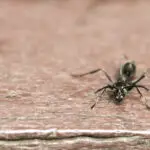Can Fire Ants Cause Hives?
Whether you’ve experienced a fire ant sting or not, it’s important to know the symptoms. They can be painful and last for days. Using a cold compress can help reduce pain and swelling. You may also want to take an oral antihistamine to reduce the itching.
If you have a severe reaction to a fire ant sting, go to the emergency room as soon as possible. Emergency medical personnel can provide you with emergency rescue medication. They may also be able to provide you with an EpiPen, which is a life-saving device.
The most common reaction to fire ant stings is localized pain and redness. In less than 24 hours, a small blister will form that appears to be filled with a pus-like material.
If the pain and redness don’t go away within a few days, it may be a sign of an infection. Scratching the affected area can also cause an infection. You should also wash the skin with soap and water to prevent infection.
A fire ant sting can cause painful, burning sensations. In some cases, itching and burning may last for a week or more.
If you experience severe swelling, dizziness or trouble breathing, get medical attention right away. An anaphylactic reaction can be life-threatening. You should carry a spare EpiPen with you at all times. You should also ask your doctor about allergy shots. You may also be able to decrease your risk of future allergic reactions by using immunotherapy.








